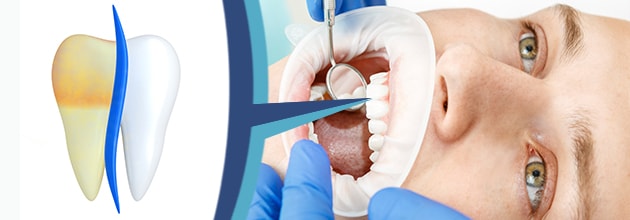Treasure Your Tooth Enamel!
Why Enamel Erosion Happens, and What You Can Do to Prevent It

You know the saying that goes... "You don't know what you've got 'til it's gone"? Well, this could definitely be said for tooth enamel – the very valuable protective surface layer of the teeth. Composed mostly of the mineral 'hydroxyapatite', tooth enamel is semi-translucent in colour, and stronger than bone! You'll want to keep enamel around for as long as you can, as it protects the teeth from decay and sensitivity. Unfortunately, contrary to the many other parts of your body containing living cells, tooth enamel cannot regenerate to make up for what's lost. But don't stress! We'll cover everything you need to know about keeping your enamel healthy and strong.
The Different Causes of Enamel Erosion
Enamel erosion can occur due to a number of factors. One of the biggest contributors is, you've guessed it – your diet. Regular consumption of sugary or acidic foods and beverages, such as citrus fruits, candy, soda and fruit juice, poses a threat to the health of your enamel. The bacteria in your mouth thrive off of these substances, and plaque bacteria produces lactic acid – one of enamel's worst enemies.
Friction and wear, on the other hand, can also erode the surfaces of the teeth. Habitually grinding or clenching the teeth, brushing the teeth with too much force, biting down on hard objects/food, or injury involving fracture or chipping can all erode tooth enamel. Heredity, some medication, and certain health conditions like dry mouth or acid reflux disease are also known to damage enamel.
Common Warning Signs
You may be wondering, "how can I tell if my enamel is eroding?" Just look out for these common signs:
- Sensitivity:your teeth may experience pain with hot and cold temperatures or sweet foods.
- Cracks/ Chips:you may notice the edges of your teeth have become more rough or jagged.
- Discolouration:your teeth may appear more yellow in colour.
- Cupping:you may notice dents on the surfaces of your teeth.
If you notice any of these signs, tell your dentist at your next appointment, and try to incorporate changes into your habits as soon as possible.
Prevention Is Your Best Bet
When it comes to keeping your enamel healthy and strong, preventive measures go a long way. A healthy oral care routine at home combined with regular professional dental cleaning and check-ups is very important. Use a fluoridated toothpaste when you brush. Limit your intake of sugary/acidic food or beverages, and use a straw when drinking these types of drinks to avoid direct contact with the teeth. Chewing sugar-free gum in between meals helps to increase saliva production, which ultimately helps to make the teeth stronger. This is especially helpful for cases of dry mouth, in addition to drinking more water. Last, but not least, if you think you may have a bruxism (teeth grinding) problem or feel you might be experiencing enamel erosion due to a health condition, let your dentist know.
Give Us a Call!
Teeth First Dental Network proudly serves patients with locations all across Ontario. Do your tooth enamel a favor... schedule a cleaning or check-up at one of our clinics today!